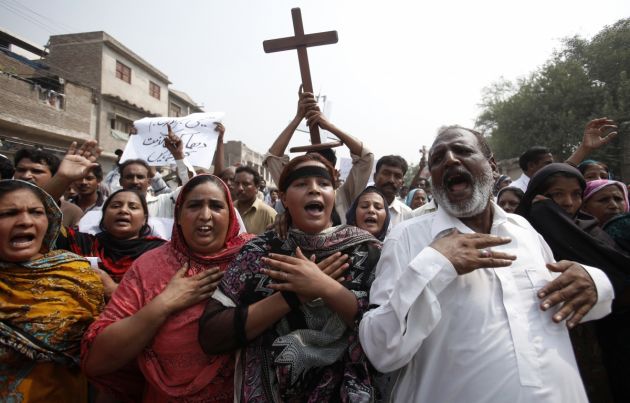Anglicans, Pope, denounce Pakistan suicide bombing, Christians protest

The Pope, the Archbishop of Canterbury and the head of the World Council of Churches have expressed shock and sadness at the killing of 85 people at a church in Pakistan by suicide bombers. At the same time Christians affected have expressed anger that the Pakistan government did not offer better protection against such violence.
The suicide bombing took place at the 130-year-old All Saints Chruch, in the city of Peshawar as worshippers were leaving the main Sunday service.
All Saints is part of the Church of Pakistan, a united church, which is part of the Anglican Communion and a member of the World Methodist Council as well as belonging to the World Council of Churches.
On one of the main roads coming into the capital, Islamabad, demonstrators burned brush and tyres and demanded government protection for the members of the Christian minority, Sky News reported Monday.
"We are a peaceful nation. We are loyal citizens of Pakistan," said Simon Jalal, a priest. "We want our rights, we want security. Security should be provided to our churches to stop more incidents like yesterday's."
Members of the Christian community and civil society in Lahore held placards and candles during a protest on Monday against a twin suicide bomb attack on a church in Peshawar.
The attack on the All Saints Church in the city of Peshawar, which also wounded more than 140 people, occurred as worshippers were leaving.
In a Tweet after the attack, Archbishop of Canterbury Justin Welby wrote, "Peshawar bomb reveals depths of human evil, yet those suffering speak of forgiveness as well as justice. That is the love of Jesus shown."
He also wrote to the Moderator of the Church in Pakistan, offering assurance of his prayers and fullest support.
Welby said, "I am appalled to learn of the attack on All Saints' Church in Peshawar as people had gathered there to pray.
"With the people of Peshawar I join in calling for the Pakistan Government and all people of good will to ensure that communities may go about their daily lives in safety, and that the perpetrators are brought to justice."
Pope Francis on Sunday condemned the Pakistan blast an act of "hatred and war."
In unprepared remarks at the end of a one-day trip to the city of Cagliari on the Italian island of Sardinia, Pope Francis said Sunday, "Today, in Pakistan, because of a wrong choice, a decision f hatred, of war, there was an attack in which over 70 people died.
"This choice cannot stand. It serves nothing. Only the path of peace can build a better world."
Pope Francis then prayed with the crowd for the victims.
The general secretary of the World Council of Churches, Rev. Olav Fyske Tveit, said in a statement Monday, "This deliberate targeting of a vulnerable Christian community came at the end of divine worship on Sunday, 22 September and is the single worst loss of life among Christians in Pakistan.
"It is particularly tragic given that All Saints Church, Peshawar, one of the oldest Christian churches in Pakistan, witnesses by the building's very resemblance to traditional Islamic architecture to the desire of the Christians of Pakistan to live peacefully with their Muslim neighbours and fellow citizens."
Tveit said that last week the World Council of Churches organized a meeting on the "Politicization of Religion and the Rights of Religious Minorities" which we heard a speaker from Pakistan describe the on-going difficulties of the Christian community there.
On the Peshawar Diocese website its bishop, Humphrey Peters, condemned the attack and expressed his condolences to all the families who lost loved ones. He appealed for Christians in Pakistan and around the world to pray for the affected families.
Bishop Peter said, "The attack on All Saint's Church is the total failure of the new government of KPK [Pakistan People's Party] and government has failed to provide security to the minorities in Khayber Pakhtunkhwa, Peshawar Pakistan."
Christians make up the four percent of people of Pakistan's 180 million people who are not Muslims and human rights groups say they often face discrimination and persecution there.